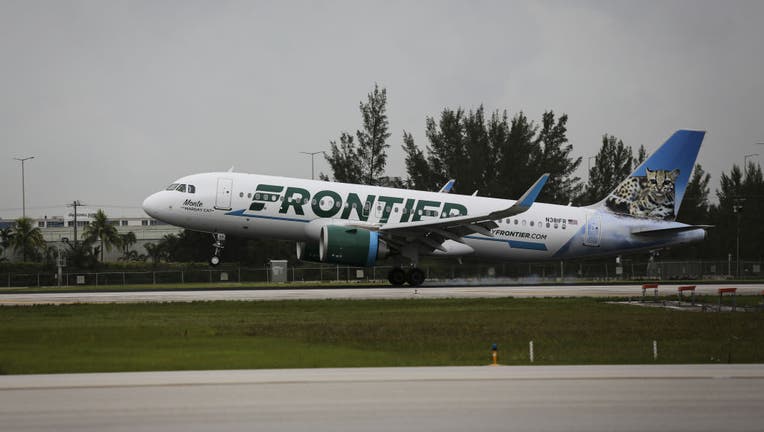6 airlines to refund $600M to travelers whose trips were canceled, significantly delayed

FLORIDA, USA - June 16: A Frontier Airlines airplane lands at Miami International Airport, in Miami, Florida, United States on June 16, 2021. (Photo by Marco Bello/Anadolu Agency via Getty Images)
The Department of Transportation (DOT) is hoping to crack down on airlines that don’t provide timely refunds to customers for canceled or significantly delayed flights.
On Monday, the department announced that Frontier Airlines and five other foreign carriers have been ordered to pay more than $600 million in refunds to travelers who were denied them since the start of the COVID-19 pandemic.
DOT said it also fined the same airlines more than $7 million for delaying refunds so long that they violated consumer-protection rules.
When the pandemic hit in early 2020, travel came to a relative standstill amid global lockdown measures, and airlines suffered great economic losses. DOT said it became flooded with consumer complaints whose flights were canceled or changed — or who were afraid to fly during the early months of the pandemic — and couldn’t get refunds.
RELATED: Travel advice, strategies for best deals this holiday season
Airlines are required to pay refunds to travelers if the flight was canceled for any reason or the airline made a significant schedule change, and the customer chooses not to travel. But DOT has never defined a cancellation or significant change, and airlines often prefer to hand out travel vouchers instead of refunds.
"When Americans buy a ticket on an airline, we expect to get to our destination safely, reliably, and affordably, and our job at DOT is to hold airlines accountable for these expectations," Transportation Secretary Pete Buttigieg told reporters on Monday.
RELATED: These luxury bus lines hope to redefine travel in America
Frontier Airlines is refunding $222 million and paying a $2.2 million civil penalty, the department said.
In a consent order, the government charged that Frontier changed its definition of a significant delay to make refunds less likely, and an online system to process credits went down for a 15-day period in 2020.
Frontier spokeswoman Jennifer de la Cruz said the Denver-based airline has already issued nearly $100 million in "goodwill refunds," including to people with non-refundable tickets who canceled on their own and were not entitled to a refund under federal law.
RELATED: Fly now, pay later: Here’s how you can book a flight but pay for it next year
The refunds "demonstrate Frontier’s commitment to treating our customers with fairness and flexibility," de la Cruz said.
The Transportation Department said TAP Portugal will refund $126.5 million and pay a $1.1 million fine; Air India will pay $121.5 million in refunds and a $1.4 million penalty; Aeromexico will pay $13.6 million and a $900,000 fine; Israel’s El Al will pay $61.9 million and a $900,000 penalty, and Colombia’s Avianca will pay $76.8 million and a $750,000 fine.
"We have more enforcement actions and investigations underway and there may be more news to come by way of fines," Buttigieg said.
U.S. officials said there would be no fines for other major U.S. airlines because they responded "shortly after" the Transportation Department reminded them in April 2020 of their obligation to provide quick refunds
Consumer advocates cheered the move against Frontier but said other larger U.S. airlines also violated rules around refunds — even if they took corrective steps more quickly.
"Frontier was a bad player in all this, and they deserve to be fined, and we’re glad they are paying the refunds they were supposed to pay, but we are very critical of how the DOT just seems to not want to go after the biggest fish, the ones causing the most problems," said Bill McGee of the American Economic Liberties Project, a non-partisan group that opposes concentrated industrial power.
In 2020, United Airlines had the most refund-related complaints filed with DOT — more than 10,000 — although smaller Frontier had a higher rate of complaints. Air Canada, El Al, and TAP Portugal were next, both over 5,000, followed by American Airlines and Frontier, both topping 4,000.
Air Canada agreed last year to pay $4.5 million to settle similar U.S. allegations of slow refunds and was given credit of $2.5 million for refunds. The Transportation Department initially sought $25.5 million in that case.
This story was reported from Cincinnati. The Associated Press contributed.

